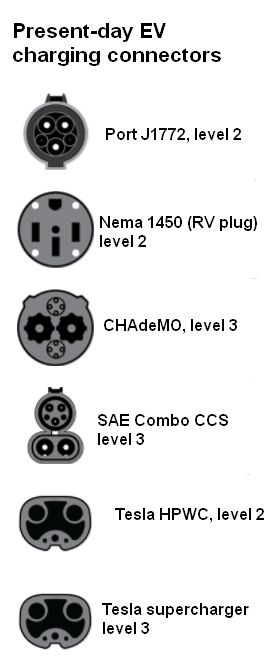Lengthy waits at the local charging station may be a thing of the past for electric vehicle owners thanks to efforts aimed at fast charging at 350 kW, handling full EV recharges in as little as 10 minutes.
Today, owners of electric vehicles have three options for recharging at public stations. Level 1 (about 1 kW) charging uses the charger included with the car to plug into a 120-V outlet. A full recharge takes about eight to 15 hours for a 30-kWh battery (standard for full electric cars). Level 2 (typically 6 kW but ranging from 3 to 20 kW) chargers work from a 240-V outlets which deliver a full  recharge in three to eight hours. Level 3 charging (typically 50 kW) is also known as a DCFC or fast charging and takes 20 minutes to an hour. That time span might be tolerable for today’s 30-kWh small cars, but it will stretch when EVs now on the drawing boards and carrying 90 kWh or more hit the market.
recharge in three to eight hours. Level 3 charging (typically 50 kW) is also known as a DCFC or fast charging and takes 20 minutes to an hour. That time span might be tolerable for today’s 30-kWh small cars, but it will stretch when EVs now on the drawing boards and carrying 90 kWh or more hit the market.
Consequently, efforts are underway on several fronts to boost charging capacity. Manufacturers have proposed a draft standard for 350 kW charging. Charging station supplier EVgo, working with ABB, has put up a test station in Fremont, Calif. to try out hardware for the super-fast charging format. The test chargers will be compatible with both CHAdeMO (proposed as a fast charging standard by an association of the same name and included in IEC 62196 as type 4).and CCS/Combo (supported by General Motors, BMW, Daimler, Ford, and others).
The station will be used by automakers for EV. Similarly, EVgo competitor ChargePoint has developed 400-kW charging technology, and five European automakers are collaborating to deploy 400 ultra-fast (350 kW) charging stations for EVs there.
Promoters of both CHAdeMO and CCS/Combo standards are working toward 150-kW charging and eventually 350-kW charging while also developing a charging infrastructure across Europe and the U.S. Of course, no EV today can accept a 350-kW charge. Several manufacturers have produced vehicles able to handle up to 100 kW, and Porsche has debuted 350-kW charging in its Mission E concept which would use an 800-V charging system.
One difficulty: Charging standards for higher capacities have yet to be settled. The SAE adopted CCS as the Fast Charging Standard. Tesla joined CharIN e.V., a consortium of automakers working toward a European fast charging network and invited other automakers to use its supercharger protocol. Porsche’s 800-V system, due to come out next year, may use some variant of CCS. Porsche has installed two 350 kW chargers in Germany as prototypes. They use the CCS charging standard and can currently charge at 50 to 150 kW until vehicles can support higher charge rates.
There are also questions about how EVs will handle charging available at drastically different rates. Experts say one harbinger of developments in this area is a system called AllCharge developed by Continental Automotive. The system features a modified electric powertrain containing an electric motor and inverter specially adapted for charging, plus a dc/dc converter optimized for regulating power flow to the battery.
When an AllCharge-equipped EV is hooked up to an ac charger, the current flows from the charging station via the electric motor to the inverter, where it is converted to into dc before being supplied to the battery. For dc charging, the current flows directly from the charging station through the inverter to the battery. Continental says AllCharge technology can always use the maximum output rate at a charging station, up to 800 V and 350 kW. As an additional benefit, the bidirectional system also provides 230 V of ac power for use on-board the EV.


Leave a Reply